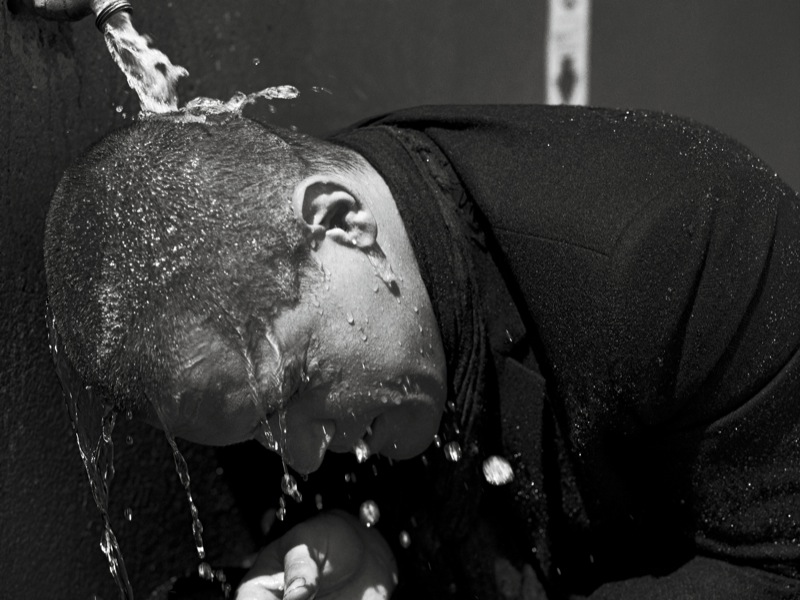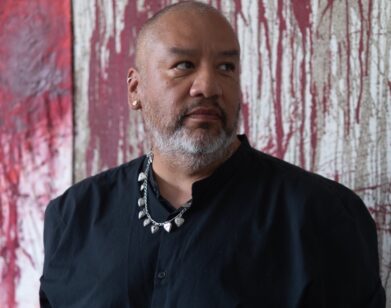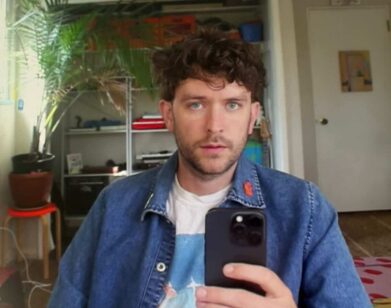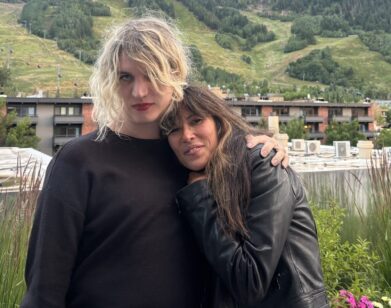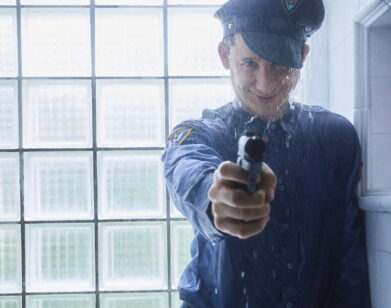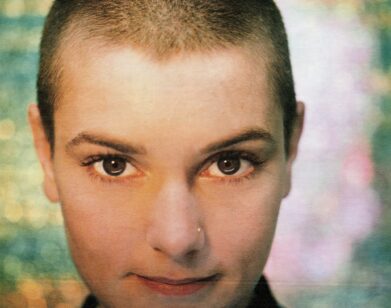Josh Brolin
W IS REALLY ABOUT A GUY WHO WAS COMPLETELY FLAILING WHO BECOMES THE PRESIDENT OF THE UNITED STATES. AND THAT’S A COMPELLING STORY.JOSH BROLIN
To understand Josh Brolin, to really get inside his skin, it helps to know that in addition to being an actor—and a fine one at that—he really knows how to pick his stocks. In fact, a few years ago, when the marquee roles weren’t coming as fast and furious as they are now, Brolin sold his ranch in Northern California and focused his energy on day—trading-the idea being that if he could supplement his income by playing the market, then he wouldn’t have to take acting jobs simply in order to make a living. Brolin was good at trading, making his moves from a computer in his home office, like Gordon Gekko in sweatpants. This was all, of course, before Robert Rodriguez cast him in Grindhouse (2007) and Ridley Scott put him in American Gangster (2007) and the Coen brothers handed him the bulk of the screen time in No Country for Old Men (2007). It was before Josh Brolin—former teen star of The Goonies (1985), journeyman thespian, husband of Diane Lane, and stepson of Yentl (his father, actor James Brolin, is married to Barbra Streisand)—became the Josh Brolin that we have before us today: a guy who has all the markings of an old-model actor, the rugged, roguish kind who looks like he belongs on the back of a horse in a Sam Peckinpah movie and seems to lack that 21st-century gene that makes movie stars care about whether you like them or not.
But back to the stock market: Soon after selling his old ranch, Brolin found himself shopping for a new one, a fact that has as much to do with his ability to negotiate the bulls and the bears as it does his innate understanding of the science of choice—those intangible forces that make people do what they do, and the internal logic that drives them. Indeed, in Brolin’s last few films, he has been hard to like but easy to love, and things aren’t about to get any less complicated: Brolin spent much of this past summer in Shreveport, Louisiana, shooting W., Oliver Stone’s new biopic of George W. Bush, in which he plays the outgoing 43rd president of the United States. He also stars alongside Sean Penn in Gus Van Sant’s upcoming Milk, a film about gay rights activist and San Francisco city supervisor Harvey Milk; Brolin plays Dan White, a political rival of Milk’s from a working-class district who would go on to assassinate both Milk and Mayor George Moscone, shooting both men at close range at City Hall in November of 1978. (During his trial, White’s lawyers would put forth the now-famous “Twinkie defense,” claiming that their client, a lifelong fitness junkie, suffered from severe depression at the time of the killings, evident by the fact that he stopped exercising and begun consuming large quantities of Twinkies.)
In addition to all of this, Brolin has also taken part in The People Speak, a forthcoming TV miniseries based in part on the best-selling book A People’s History of the United States by political scientist and historian Howard Zinn. The series features music by, among others, Brolin’s interviewer here, Pearl Jam front man Eddie Vedder. With this cleansing moment in American history upon us and a historic presidential election in the making, the 40-year-old Brolin and Vedder sat down to surmise the state of the union, the bullish upturn of Brolin’s career, and the lengths to which some people are willing to go for their art. So, how to explain Brolin’s recent windfall? It’s the economy, stupid
EDDIE VEDDER: I just finished touring, and I’m on a detox thing. It’s a heavy detox, so nothing in my belly except water, salt, and cayenne pepper.
JOSH BROLIN: You’re drinking the lemon water and the cayenne and all that?
EV: Yeah, I’m doing the master cleanse, which also means I’m not smoking. I haven’t smoked for four days. This is probably the first phone conversation I’ve had in 10 years where I haven’t had a smoke. It’s like trying to talk without using adverbs.
JB: Right. I just lit up. Sorry. Where are you?
EV: I’m back in Seattle.
JB: We were just at the DNC [Democratic National Convention] in Denver, doing The People Speak. I didn’t see Howard [Zinn] there, but he was telling me over the phone the whole deal with you in Boston and how you put the spotlight on him in the middle of the show.
EV: Yeah. His wife [the artist Roslyn Zinn, who died of ovarian cancer on May 14 of this year] was the best. She made Ruth Gordon look kind of like a dim bulb. So I put her picture in the program, a really beautiful picture of her and Howard, and we dedicated a tune to her. She was one of those people . . . When she passed away, I felt her presence around me.
JB: Hugely. Me, too. The last time I saw her was in Boston when we did The People Speak performance at the Majestic Theatre with Viggo [Mortensen] and all those guys. She was really sick at the time, but the great thing with her was that you never knew it, man. She was incredible.
EV: Well, the timing of it was just absolutely stunning, that she made it out for that performance. So you were at the DNC?
JB: I was. I saw Cindy Sheehan speak [at the Open the Debates rally], and then spent some time with her after that. I guess she’s trying to run against Nancy Pelosi for her U.S. Congressional seat. And then I saw Sean [Penn] speak and about half of [Ralph] Nader’s speech. Sean was fantastic, man. He’s incredibly well-spoken and passionate. I know that the guy gets so much shit about speaking out, but it’s amazing. He’s the most empathetic guy, so I’m always blown away when he gets up in front of people.
EV: Well, there’s this thing that you hear a lot these days. People say, “I’m tired of hearing about the war in Iraq. I’m tired of hearing about it.” And it makes me realize how few people have deeper connections with it, as far as knowing people who have come back paralyzed or who have died, or families that have been affected . . . If they had a connection to it, then they wouldn’t be tired of hearing about it.
JB: It’s almost like a denial process. It reminds me of when the AIDS epidemic first started. There were people who said, “Well, if there weren’t gays, then we wouldn’t have this problem. It’s got to be because of them—let it be them instead of us.” But when you educate yourself about it, you can’t help but realize that we’re all affected by it. I think that things like that just become too daunting for people. That’s what’s great about Howard Zinn. Here’s a guy who says, “Look, democracy doesn’t come from above-it comes from below.” The only way change will ever happen is if we speak up, and we have to know that it actually has an impact. Because we have a lot more power than we think we do, I think.
EV: Well, another idea Howard has turned me on to is that the guys with the power on top never just give it away. They have to be challenged. Which leads us to your investigating this guy, George W. Bush, in order to play him in W.
JB: Do you know how weird it was for me to have done so much research on George W. Bush? There’s this churning that goes on when you actually get into somebody’s life. W. is not necessarily a political film, but it was sort of a contrasting reality for me to get into George W. Bush as a character because of how I felt about his administration before I started making the film. I’ll never forget it, man. Diane and I were up north—we were just kind of vacationing before I started on the film-and I was talking to a lot of people and reading a bunch of books. So one day I was outside with these redwoods around me, and I had just finished this book called The Faith of George W. Bush, and I walked in and looked Diane in the eye, and she goes, “What’s the matter?” And I said, “I actually like this guy right now. I don’t know why, and I don’t know how.” What was so fascinating is that George W. Bush is kind of an inspiration for anybody who is off on any sort of drunken, lost tangent. This guy literally just said one day, “This is no good. My life is going nowhere—I’m going to quit drinking.” And so he starts to deepen his relationship with Jesus and becomes almost a different person who eventually goes on to become the president of the United States. You can’t help but be inspired by somebody with that kind of conviction and steel will. But those demons he was dealing with exist no matter what, and they’ll eventually find their way out. They will resurface—it’s just a question of how.
EV: Yeah, that’s why I’m detoxing this week. It’s just to set myself up for next month.
JB: [laughs] Why are you detoxing?
EV: Well it was a long couple of years, and being on the road a lot . . . I’m ready to just clean up my act. I don’t know how it’s all going to come out-this is, like, four days in. In fact, I don’t want to talk about it. But it does feel weird. I’m feeling different.
JB: Are you feeling high yet? I’ve done what you’re doing a few times. After the initial period of feeling like you have the flu come these five or six days of speediness. Obviously, that hasn’t hit you yet.
EV: No. I’m more kind of walking around in a daze, wondering if this is all really happening.
JB: That’s perfect for this conversation.
EV: But now, in addition to George W. Bush, you play another sort of intense political figure, Dan White, in Milk. Did you become as forgiving of Dan White as you’re saying you did of George W.?
JB: No, and Dan White is ostensibly the more forgivable character. I don’t want to insult his family or his kid, whom I met and who was very pleasant. I don’t want to insult anybody, but the truth of the matter is that one of the big differences between George W. Bush and Dan White is that George W. Bush has this conviction in his foresight. At least Bush feels like—and I’ve heard him say it-“You can’t judge me now, because look at Abraham Lincoln. When he was in the middle of that war and 600,000 people died, he was vilified for the Gettysburg Address because they felt it was too short and almost insulting, and now you look back and it’s considered one of the great speeches of all time and he’s considered one of the great presidents of all time.” All that kind of shit. But the thing with Dan White was that he didn’t have any foresight at all. They had just created multiple city supervisor [positions]. In San Francisco, it used to be that just one city supervisor dealt with the whole city, and then I think it was broken up into nine different districts, or something like that. Dan White was the Great White Hope because everything was changing. There was the gay and lesbian movement and all that stuff happening. But it just wasn’t his time. So somebody who was more politically savvy would have realized: Okay, this is happening now—this is Harvey Milk’s time, and then down the road I’ll have my time. But he didn’t see that. He just kind of wallowed in the fact that he wasn’t being noticed, that he wasn’t being praised—and this was a guy who was used to being praised in his small district. I think he just got more and more frustrated, and it ended up the way it did. Who knows why? There’s that whole Twinkie defense, which was a small part of his defense, but they just held on to it, and it’s become a much bigger thing than the reality of what it was. The killings were obviously premeditated. He had the bullets in his vest. I think he was planning on killing four people and then ended up killing just Mayor Moscone and Harvey. Did you ever see Gus Van Sant’s film Elephant [2003]? There’s a shot of an elephant following the kid going into school, and it lasts forever. It follows him for, like, 10 minutes. When we were doing Milk we realized that when Dan White shot Mayor Moscone, it was on one side of City Hall, so he had to leave that office after he shot Moscone and walk, I don’t know, it must have been at least a four-minute walk all the way to the other side of City Hall. It’s fascinating to me what he must have been thinking during that walk. Was there a moment when he thought, What am I doing? Was he completely immersed in this kind of momentary psychosis? So I said to Gus, “Remember that shot in Elephant? What if we try to do something like that, just to see what this guy is thinking? Maybe he could go through this myriad of emotions: crying, laughing, smiling, immersed, completely numb, whatever. Let me just try a few things.” Anyway, Gus kept some of it, and it works.
EV: So without putting you in a position of having to gush, it seems like the last bunch of films you’ve made have been directed by people who are among the best filmmakers of our generation: the Coen brothers, Gus Van Sant, Oliver Stone. And this is all within the last three years.
JB: Ridley Scott, too, on American Gangster. He’s another amazing guy.
EV: Oh, yeah, yeah. You guys—you actors—move around. We stay in a band, for the most part, and we do our thing. So, to me, what you’ve been doing is kind of like playing with Jimi Hendrix and then playing with John Coltrane.
JB: I don’t know what it’s like for you being around people you’ve appreciated since you were a kid, but there was a point in my life . . . Look, I’ve never gotten bitter about where I was at in my career. I’ve always earned enough money to put my kids through school and eat and all that, so I was never one of those guys who said, “Why am I not in this other position? Why am I not that other guy? Why am I me?” When this stuff started to happen . . . I guess it mostly started when Robert Rodriguez cast me in Grindhouse, and then there was some kind of snowball effect from there. I know that, for me, working with people like Robert Rodriguez and Ridley Scott and the Coen brothers and Oliver Stone and Gus Van Sant was so much easier than working with a lot of the people I had worked with before, because with these guys, there’s not a lot of ego involved. It’s all about the work. It’s all about how to make the story better. So at the end of the day, you feel a trust that you usually don’t feel—or at least I haven’t felt in the past with most people. I’d heard rumors about Oliver Stone before we went to work on W., and I don’t get it. To me, he’s one of the most sensitive directors. He is just fascinated by why people act in the ways that they do. His movies are an excuse to explore that idea, and he wants to work with people who are as passionate about exploring it as he is. So we got along brilliantly.
EV: So you mentioned earlier seeing Sean speak and how good he was. And now we have Barack Obama—
JB: Who is a great speaker.
EV: Well, if he can just get through the election process without having to cater to the bigger corporate powers and talk about things in a way that gets people to listen . . . It’s a difficult thing to do; I certainly couldn’t do it. But it seems like Barack is the guy.
JB: Do you trust him?
EV: Absolutely. I’ve done a bit of research in order to come to that conclusion, but I do. I still think that with any candidate, whoever gets elected, there are going to be certain issues or platforms that those who feel strongly can work with him on. You can’t be perfect. You can’t be the perfect father. You can’t be the perfect singer. You can’t be the perfect president. But I’ve stepped back a few times and had these crazy epiphanies that we are blessed by having him as a candidate at this time in our history. If we were ever to have a man of color become president—and it shouldn’t be about that, and it doesn’t need to be, because he’s qualified on all levels—but if you do think about it, just in terms of that idea of unifying people, it’s a huge positive.
JB: I think so too. I was just over in Europe. We are not a liked people over there.
EV: We tour a lot, so I’m aware of that. But maybe a lot of people back in the States aren’t really aware of it on a daily basis. They don’t realize the huge amount of goodwill that we need to build back up.
JB: Did you watch the RNC [Republican National Convention]? Did you see Sarah Palin’s speech?
EV: I did. Yeah.
JB: What did you think?
EV: I thought she was . . . I didn’t respond to the kind of sarcastic tone. It felt like some of the speech was written as though it were a Saturday Night Live newscast. Maybe that’s because she looks very similar . . . She’s got her Tina Fey thing going.
JB: That’s what my wife kept saying: Tina Fey. It just seems to me that from the Republican perspective, there’s so much focus on how bad the other side is, as opposed to their running on their own trajectory within the issues.
EV: I would think we have a trajectory of failure on the Republicans’ part-a failed strategic direction-except that I think it’s been working for them. When you think about how they managed to make John Kerry look bad during the last election for actually serving in Vietnam, and testifying in Congress after he’d gotten medals, and said that he didn’t believe in them or that he didn’t believe in the war and that it should stop . . . That they could turn that-
JB: Into a negative.
EV: When their guy, George W. Bush, never even went to Vietnam. Do you cover that at all in W.?
JB: The fact that he didn’t go? No. We don’t deal with that. But we do deal with a lot of other milestones. We’re following him from approximately the ages of 21 to 57, so from 1967 to after the U.S. goes to war with Iraq in 2003. A lot of what has happened springboarded from his relationship with his dad, and a lot of it is in reaction to what he was like when he was younger, before he made the decision-at 40 years old-to take whatever puzzle there was to his life and make the pieces fit together. I don’t know how people are going to react to the film, because I think what the movie really does is bring back the idea of “Why did we vote for this guy?” Because regardless of whether there was ballot manipulation or not, you still have 50 million people who voted for George W. Bush [in the 2000 election]. And why? Because he’s fallible? Because he reminds you of us? So the movie really gets into that idea of “Don’t forget that we are empowered to hire these people. That’s what we do. We are hiring these people. They don’t hire themselves.” It’s irresponsible to disregard this guy as some bumbling, blathering idiot who has no intelligence whatsoever, because I don’t think we’d be in the predicament that we are in right now if that was the case. W. is really about a guy who was completely flailing who becomes the president of the United States. And that’s a compelling story.
EV: The interesting thing is that it seems like George W. Bush would have been happy being the president of anything. He could have been president of Major League Baseball.
JB: That would have been great.
EV: Less people killed. It wouldn’t have affected the world on a planetary level. Sure, there would have been little things. There would have been scandals and kind of numbskull things here and there . . .
JB: But on a very minute level.
EV: And he would have been happy and the family would have been happy and his dad would have been happy. The Republicans initially sort of saw him as a blank canvas, didn’t they?
JB: Completely.
EV: It seems like they interviewed him when he was governor of Texas to see what kind of candidate he could be. Then they were like, “Oh, yeah—“
JB: “This is the guy.” Because they thought he would be easy to control. Yet none of that was what happened. I mean, for the first months of his administration, there wasn’t much to do because 9/11 hadn’t happened yet. George W. Bush brought a lot of minorities into his administration, which was a positive thing, and they had some issues that they wanted to press, but 9/11 really gave them direction. It gave them a purpose. I do think, from the other side, that W. was somewhat of an innocent in his thinking about what Ronald Reagan did during the Cold War and by bringing democracy to Eastern Europe. I think he believed that he could do the same thing by bringing democracy—or Midland, Texas, really-to the Middle East. I truly think he felt it was possible. “I want to do for the Middle East what Reagan did for the Soviet Union.”
EV: That would be a hard thing to believe in. I’m not a college graduate, but I don’t know how he could have truly believed that the flower of democracy was going to blossom in that part of the world—at least in part because the governments there are so tied to religion . . . This kind of talk really makes me want to have a smoke! Remember that Pixies song “I’ve Been Tired,” where Frank Black sings, “Politics go so good with beer”?
JB: There’s something very true about that.
EV: You said everything started for you with Grindhouse, but you’ve been making films for a long time. I remember Flirting With Disaster [1996]—of course, that was seven or eight years ago.
JB: No, 12. Did you see it?
EV: I saw it when it came out, and I’ve seen it again recently. The first time we met, I didn’t realize that you had been in the film until you reminded me of the conversation you have in the back of the car about—
JB: Right. The blow job conversation. Humming.
EV: Then at the end of the movie, with your head in Patricia Arquette’s—
JB: Armpit. Did I tell you that story?
EV: No.
JB: Okay, so Patricia and I, we had known each other sort of loosely before. Anyway, we were doing this scene the way the scene was written: We kissed and then Ben Stiller’s character walks into the room and says, “What are you doing? How are you doing this?” But we saw it and it was boring. So I said, “Well, what if my character had a foot fetish? What if he was sucking on her big toe? He could be talking about her big toe and how beautiful big toes are and how beautiful feet are.” But the director, David O. Russell, was like, “Uh . . . I don’t know.” So then Patricia said, “What about the armpit?” And David says, “Yeah, yeah, that’s great.” But I was like, “I don’t know, man,” because I’m thinking, I’ve got to lick the armpit. And Patricia goes, “Yeah, you could just lick my armpit,” and she lifted her arm and, I guess because that’s how she saw the character, she had grown out all her underarm hair. Then I had, like, a severe reaction. I said, “No! I don’t like that idea. I really like the foot idea. Or maybe we could go with the small of her back. But the underarm thing, I don’t think it’s proper. It seems a little disgusting to me.” Anyway, they were already on it, that it was working. So we shot it and I had to lick her armpit with the hair.
EV: This is really great for me, man. This is going to keep me from eating for days.
JB: It’s the disgusting truth of my profession. Anyway, we saw the footage, and it was so disgusting that David said, “We can’t have the hair. Patricia has to shave the hair.” So what you see in the film is the third attempt at making that scene playable.
EV: Well, the scene worked like it was written. [Brolin laughs] Anyhow, I think it’s great that films like W. and Milk can be made.
JB: We’ll see how they’re received. So let me ask you this: What did you think when you heard that I was going to do this role as George W. Bush?
EV: I thought about how weird it was that Diane was going to have to make out with a Republican.

